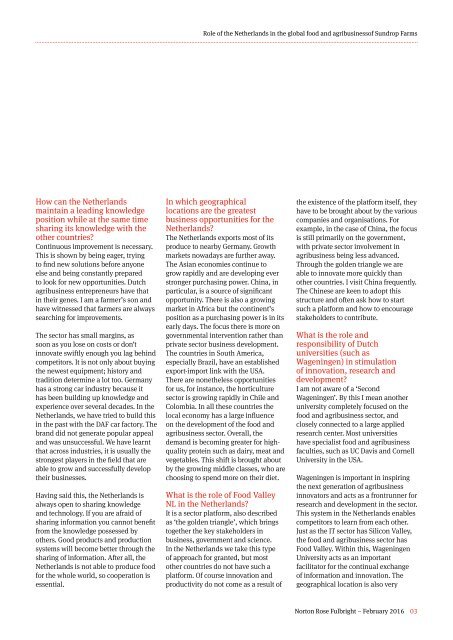Cultivate
cultivate-issue-10-137123
cultivate-issue-10-137123
Create successful ePaper yourself
Turn your PDF publications into a flip-book with our unique Google optimized e-Paper software.
Role of the Netherlands in the global food and agribusinessof Sundrop Farms<br />
How can the Netherlands<br />
maintain a leading knowledge<br />
position while at the same time<br />
sharing its knowledge with the<br />
other countries?<br />
Continuous improvement is necessary.<br />
This is shown by being eager, trying<br />
to find new solutions before anyone<br />
else and being constantly prepared<br />
to look for new opportunities. Dutch<br />
agribusiness entrepreneurs have that<br />
in their genes. I am a farmer’s son and<br />
have witnessed that farmers are always<br />
searching for improvements.<br />
The sector has small margins, as<br />
soon as you lose on costs or don’t<br />
innovate swiftly enough you lag behind<br />
competitors. It is not only about buying<br />
the newest equipment; history and<br />
tradition determine a lot too. Germany<br />
has a strong car industry because it<br />
has been building up knowledge and<br />
experience over several decades. In the<br />
Netherlands, we have tried to build this<br />
in the past with the DAF car factory. The<br />
brand did not generate popular appeal<br />
and was unsuccessful. We have learnt<br />
that across industries, it is usually the<br />
strongest players in the field that are<br />
able to grow and successfully develop<br />
their businesses.<br />
Having said this, the Netherlands is<br />
always open to sharing knowledge<br />
and technology. If you are afraid of<br />
sharing information you cannot benefit<br />
from the knowledge possessed by<br />
others. Good products and production<br />
systems will become better through the<br />
sharing of information. After all, the<br />
Netherlands is not able to produce food<br />
for the whole world, so cooperation is<br />
essential.<br />
In which geographical<br />
locations are the greatest<br />
business opportunities for the<br />
Netherlands?<br />
The Netherlands exports most of its<br />
produce to nearby Germany. Growth<br />
markets nowadays are further away.<br />
The Asian economies continue to<br />
grow rapidly and are developing ever<br />
stronger purchasing power. China, in<br />
particular, is a source of significant<br />
opportunity. There is also a growing<br />
market in Africa but the continent’s<br />
position as a purchasing power is in its<br />
early days. The focus there is more on<br />
governmental intervention rather than<br />
private sector business development.<br />
The countries in South America,<br />
especially Brazil, have an established<br />
export-import link with the USA.<br />
There are nonetheless opportunities<br />
for us, for instance, the horticulture<br />
sector is growing rapidly in Chile and<br />
Colombia. In all these countries the<br />
local economy has a large influence<br />
on the development of the food and<br />
agribusiness sector. Overall, the<br />
demand is becoming greater for highquality<br />
protein such as dairy, meat and<br />
vegetables. This shift is brought about<br />
by the growing middle classes, who are<br />
choosing to spend more on their diet.<br />
What is the role of Food Valley<br />
NL in the Netherlands?<br />
It is a sector platform, also described<br />
as ‘the golden triangle’, which brings<br />
together the key stakeholders in<br />
business, government and science.<br />
In the Netherlands we take this type<br />
of approach for granted, but most<br />
other countries do not have such a<br />
platform. Of course innovation and<br />
productivity do not come as a result of<br />
the existence of the platform itself, they<br />
have to be brought about by the various<br />
companies and organisations. For<br />
example, in the case of China, the focus<br />
is still primarily on the government,<br />
with private sector involvement in<br />
agribusiness being less advanced.<br />
Through the golden triangle we are<br />
able to innovate more quickly than<br />
other countries. I visit China frequently.<br />
The Chinese are keen to adopt this<br />
structure and often ask how to start<br />
such a platform and how to encourage<br />
stakeholders to contribute.<br />
What is the role and<br />
responsibility of Dutch<br />
universities (such as<br />
Wageningen) in stimulation<br />
of innovation, research and<br />
development?<br />
I am not aware of a ‘Second<br />
Wageningen’. By this I mean another<br />
university completely focused on the<br />
food and agribusiness sector, and<br />
closely connected to a large applied<br />
research center. Most universities<br />
have specialist food and agribusiness<br />
faculties, such as UC Davis and Cornell<br />
University in the USA.<br />
Wageningen is important in inspiring<br />
the next generation of agribusiness<br />
innovators and acts as a frontrunner for<br />
research and development in the sector.<br />
This system in the Netherlands enables<br />
competitors to learn from each other.<br />
Just as the IT sector has Silicon Valley,<br />
the food and agribusiness sector has<br />
Food Valley. Within this, Wageningen<br />
University acts as an important<br />
facilitator for the continual exchange<br />
of information and innovation. The<br />
geographical location is also very<br />
Norton Rose Fulbright – February 2016 03


